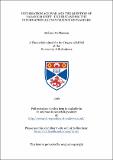Files in this item
Information age war and the question of paradigm shift : understanding the information age's influence on warfare
Item metadata
| dc.contributor.advisor | Hoffman, Bruce | |
| dc.contributor.author | McPherson, Melissa | |
| dc.coverage.spatial | 363p. | en_US |
| dc.date.accessioned | 2018-07-09T10:46:15Z | |
| dc.date.available | 2018-07-09T10:46:15Z | |
| dc.date.issued | 1999-07 | |
| dc.identifier.uri | https://hdl.handle.net/10023/15105 | |
| dc.description.abstract | This thesis examines the information age's influence on war, and attempts to establish both an understanding of what information age war is and how it may change warfare. Specifically, the thesis focuses on the question of military paradigm shift, and asks whether information age war constitutes a change of sufficient magnitude to challenge the established models for understanding warfare. The first chapters examine the information age's role as a force of change: demonstrating that the question of information age military paradigm shift clearly warrants a more detailed investigation. The thesis then examines sequentially four critical aspects of war, and the information age's influences on each. The how, what, why, and who of warfare are identified as the most salient barometers of paradigm shift given that significant changes in each of these elements would necessarily and fundamentally alter both the practice and understanding of warfare. This thesis' argument that information age war does not clearly fulfil any of these criteria, and therefore does not require a new military paradigm, is perhaps its main and most important finding. While information age war will doubtless introduce many significant and notable changes to modem war, the present models for explaining war should accommodate the majority of these changes relatively easily - though perhaps not necessarily always in the manner expected. One exception is particularly notable. The information age's influence on the 'who' of war proves difficult to reconcile with the current paradigm because of its potential to shift the balance of military advantage between state and non-state actors. Such a profound change could ineluctably challenge the traditional understanding of who can wage war. This, added to the significant, if not paradigmatic shifts in the other three criteria, points to the need not so much to establish a new paradigm of war, but to reinterpret and adjust the paradigm that currently explains this phenomenon. The thesis therefore concludes with an analysis of this reinterpretation and its implications both for the understanding of war and for the consequences of waging war in the information age. | en_US |
| dc.language.iso | en | en_US |
| dc.publisher | University of St Andrews | |
| dc.subject.lcc | U163.M7 | |
| dc.subject.lcsh | Information warfare | |
| dc.title | Information age war and the question of paradigm shift : understanding the information age's influence on warfare | en_US |
| dc.type | Thesis | en_US |
| dc.contributor.sponsor | University of St Andrews | en_US |
| dc.contributor.sponsor | St Andrews Society of the State of New York | en_US |
| dc.contributor.sponsor | Vassal' College’s Peabody Scholarship | en_US |
| dc.type.qualificationlevel | Doctoral | en_US |
| dc.type.qualificationname | PhD Doctor of Philosophy | en_US |
| dc.publisher.institution | The University of St Andrews | en_US |
This item appears in the following Collection(s)
Items in the St Andrews Research Repository are protected by copyright, with all rights reserved, unless otherwise indicated.

